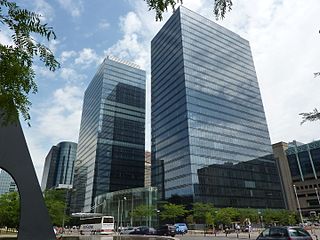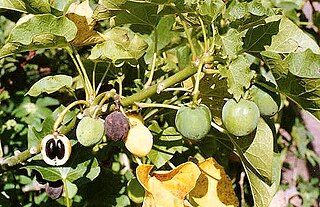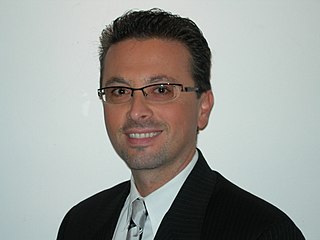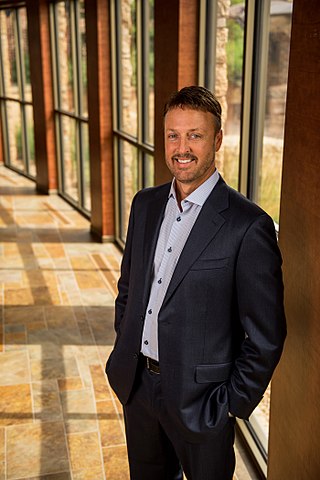
The economy of Belgium is a highly developed, high-income, mixed economy.

A biorefinery is a refinery that converts biomass to energy and other beneficial byproducts. The International Energy Agency Bioenergy Task 42 defined biorefining as "the sustainable processing of biomass into a spectrum of bio-based products and bioenergy ". As refineries, biorefineries can provide multiple chemicals by fractioning an initial raw material (biomass) into multiple intermediates that can be further converted into value-added products. Each refining phase is also referred to as a "cascading phase". The use of biomass as feedstock can provide a benefit by reducing the impacts on the environment, as lower pollutants emissions and reduction in the emissions of hazard products. In addition, biorefineries are intended to achieve the following goals:
- Supply the current fuels and chemical building blocks
- Supply new building blocks for the production of novel materials with disruptive characteristics
- Creation of new jobs, including rural areas
- Valorization of waste
- Achieve the ultimate goal of reducing GHG emissions

Biofuel development in India centres mainly around the cultivation and processing of Jatropha plant seeds, which are very rich in oil, ranging from 27 to 40%, and averaging 34.4%. The drivers for this are historic, functional, economic, environmental, moral and political.
The Energy Biosciences Institute (EBI) is an organization dedicated to developing new sources of energy and reducing the impact of energy consumption. It was created in 2007 to apply advanced knowledge of biology to the challenges of responsible, sustainable energy production and use. Its main goal is to develop next-generation biofuels—that is, biofuels that are made from the non-edible parts of plants and reduce greenhouse gas emissions.
Science and technology in Flanders, being the Flemish Community and more specifically the northern region of Belgium (Europe), is well developed with the presence of several universities and research institutes. These are strongly spread over all Flemish cities, from Kortrijk and Bruges in the Western side, over Ghent as a major university center alongside Antwerp, Brussels and Leuven to Hasselt and Diepenbeek in the Eastern side.

The Ministry of New and Renewable Energy (MNRE) is a ministry of the Government of India, headed by current Union Cabinet Minister Raj Kumar Singh, that is mainly responsible for research and development, intellectual property protection, and international cooperation, promotion, and coordination in renewable energy sources such as wind power, small hydro, biogas, and solar power.

Biobased economy, bioeconomy or biotechonomy is economic activity involving the use of biotechnology and biomass in the production of goods, services, or energy. The terms are widely used by regional development agencies, national and international organizations, and biotechnology companies. They are closely linked to the evolution of the biotechnology industry and the capacity to study, understand, and manipulate genetic material that has been possible due to scientific research and technological development. This includes the application of scientific and technological developments to agriculture, health, chemical, and energy industries.
Biogasoline is a type of gasoline produced from biomass such as algae. Like traditionally produced gasoline, it is made up of hydrocarbons with 6 (hexane) to 12 (dodecane) carbon atoms per molecule and can be used in internal combustion engines. However, unlike traditional gasoline/petroleum based fuels, which are mainly composed from oil, biogasolines are made from plants such as beets and sugarcane or cellulosic biomass- substances normally referred to as plant waste.

Sustainable biofuel is biofuel produced in a sustainable manner. It is not based on petroleum or other fossil fuels. It includes not using plants that are used for food stuff to produce the fuel thus disrupting the world's food supply.
Wim Soetaert is a chemical and biochemical engineer who heads the Centre of Expertise for Industrial Biotechnology and Biocatalysis at Ghent University, Faculty of BioScience Engineering. His research group is active in the development of fermentative and biocatalytic production processes.

An aviation biofuel is a biofuel used to power aircraft and is said to be a sustainable aviation fuel (SAF). The International Air Transport Association (IATA) considers it a key element to reducing the carbon footprint within the environmental impact of aviation. Aviation biofuel could help decarbonize medium- and long-haul air travel generating most emissions, and could extend the life of older aircraft types by lowering their carbon footprint. The jargon synthetic paraffinic kerosene (SPK) refers to any non-petroleum-based fuel designed to replace kerosene jet fuel, which are often, but not always, made from biomass.
This page is an index of sustainability articles.

The use of biofuels varies by region. The world leaders in biofuel development and use are Brazil, United States, France, Sweden and Germany.

As of 2019, renewable energy technologies provide about 17.3% of Canada's total primary energy supply. For electricity renewables provide 67%, with 15% from nuclear and 18% from hydrocarbons.
Bioproducts or bio-based products are materials, chemicals and energy derived from renewable biological material.

Dr. George Philippidis is a renewable energy and sustainability leader, who has published and spoken extensively about the global need for renewable energy as the foundation of a green economy and a sustainable society. He advocates the development of renewable power and fuels to enhance energy security, combat climate change, and secure sustainable economic growth. He has authored 11 cleantech patents, written numerous articles, and spoken nationally and internationally emphasizing that renewable energy can initially supplement and augment current resources and progressively replace fossil energy based on its own merits rather than on government policy.

A circular economy is a model of resource production and consumption in any economy that involves sharing, leasing, reusing, repairing, refurbishing, and recycling existing materials and products for as long as possible. The concept aims to tackle global challenges such as climate change, biodiversity loss, waste, and pollution by emphasizing the design-based implementation of the three base principles of the model. The three principles required for the transformation to a circular economy are: designing out waste and pollution; keeping products and materials in use, and regenerating natural systems." CE is defined in contradistinction to the traditional linear economy. The idea and concepts of a circular economy have been studied extensively in academia, business, and government over the past ten years. It has been gaining popularity because it can help to minimize carbon emissions and the consumption of raw materials, open up new market prospects, and, principally, increase the sustainability of consumption.

Jeff Broin is the founder of POET, LLC, a leading producer of biofuels and coproducts. He currently serves as chairman and CEO.
Bioproducts engineering or bioprocess engineering refers to engineering of bio-products from renewable bioresources. This pertains to the design and development of processes and technologies for the sustainable manufacture of bioproducts from renewable biological resources.
Cellular agriculture focuses on the production of agricultural products from cell cultures using a combination of biotechnology, tissue engineering, molecular biology, and synthetic biology to create and design new methods of producing proteins, fats, and tissues that would otherwise come from traditional agriculture. Most of the industry is focused on animal products such as meat, milk, and eggs, produced in cell culture rather than raising and slaughtering farmed livestock which is associated with substantial global problems of detrimental environmental impacts, animal welfare, food security and human health. Cellular agriculture is a field of the biobased economy. The most well known cellular agriculture concept is cultured meat.











